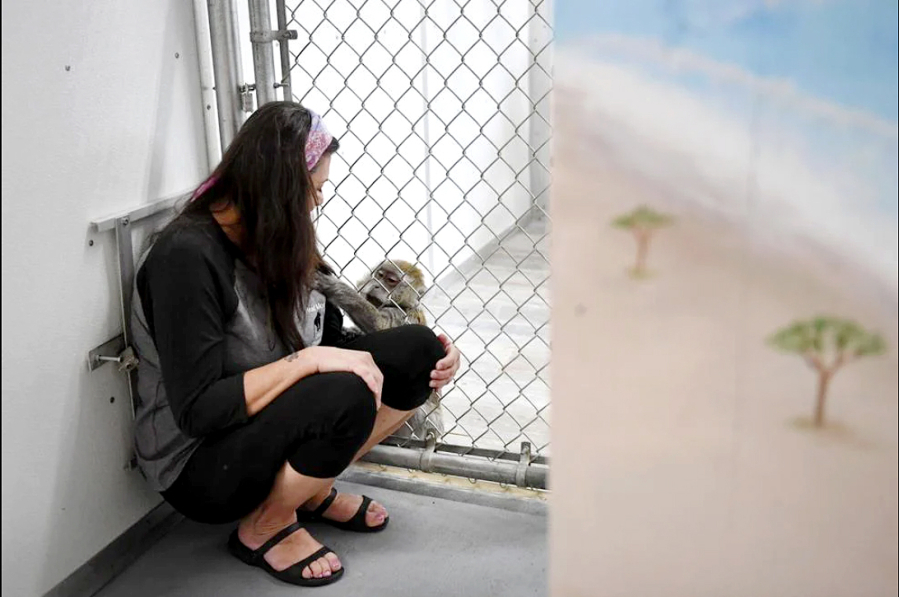LONGVIEW — One of the newest residents of a Longview primate rescue is Tawney, a 16-year-old Capuchin, who struggles to walk.
Her fingers and toes are bent from malnutrition and lack of space. She had never been outside or given water until she was rescued.
Now she squeaks a little greeting from her perch to all who wander into the ‘A’ Barn at OPR Coastal Primate Sanctuary.
Founders and owners Polly and Skip Schultz rescued their first primate — a Macaque — 26 years ago. Macaques are often used in research labs because their biology is so similar to humans, Schultz said.
“I have a soft spot for Macaques,” said Polly Schultz.
Schultz has had a special place in her heart for any animal, based on her time as a veterinary technician and animal control officer.
Her passion of rescuing monkeys came by accident. She said she saw an advertisement for a baby monkey for sale and thought it would be similar to caring for a raccoon, later learning it was far more challenging.
Fast forward to today, when she owns the sanctuary which rescues primates from ill-informed owners, research labs and neglect situations. The nonprofit takes about $90,000 to run annually and houses 14 monkeys with two more on the way. They spend about $300 each week on fresh produce alone.
The organization was started in Dallas, Oregon, but once a donor donated 30 acres in Longview, the couple, along with their monkeys moved. A house and barn were already on the acreage and over time the Schlutzes built two more barns and play areas.
When they moved to Longview 16 years ago, they also changed their name from Oregon Primate Rescue to OPR Coastal Primate Sanctuary.
Sanctuary operations
Bonnie Gallegos has been volunteering for the rescue for about four months. She is one of 11 volunteers who cleans enclosures and provides enrichment to the monkeys.
The rescue consists of three barns with outdoor enclosures attached.
Most of the monkeys acquired by the rescue have never had enrichment or playtime from their previous owners. Because of this, novel enrichment is key, according to Schultz.
“After 26 years, it is hard to come up with new things for the monkeys to do,” she said.
The shelter uses donated dog toys, blankets, stuffed animals, PVC piping filled with peanut butter and other treats, playgrounds filled with slides, hammocks and mini pools, and other homemade toys made from common household items such as coffee creamer bottles.
The monkeys are rotated each week between the three barns so they don’t get too bored in one place.
Keeping the monkeys engaged and entertained is the key to a physically, emotionally and mentally primate, Schultz said.
When monkeys first come to the sanctuary from a lab, they are quarantined and acclimated to outdoor light. Schultz said it takes about a month for the primates to lose their fear of the outdoors and are acclimated by increasing the amount of light they see each day through a window. This prevents shock to the monkeys after being kept in dark, small cages their entire life.
After they have acclimated to the outdoors and treated by a veterinarian, monkeys are put in a separate space within in the barn. They can see and talk with other monkeys but cannot physically interact with them. After they become comfortable, Schultz will allow the new rescue to choose the group they want to co-exist in to ensure they are not bullied by their partner.
“We try to pair every monkey because social contact is so important for their health,” said Schultz.
But in the barn, and even within a pair’s enclosure, each monkey belongs to a different hierarchy level. Gallegos said that in the shelter, just as it in the wild, “they know who they can snatch food from and who to bow down to.”
Monkeys can do serious damage if they start fighting. It’s their innate desire to keep their rank and will fight to the death in the wild if they are threatened.
“Personalities can change and range from Mother Teresa to Jeffery Dahmer,” said Gallegos.
To ensure safety, monkeys and humans don’t interact much. Keepers may feed, or let monkeys pick at their hair, but never pull them out of their enclosure. Monkeys are known to bite and grab at just about anything.
The gates prevent fights between other monkeys and from attacks on humans, which Schultz said has never occurred.
Every nut and bolt are also spot welded down so the primates can’t twist the bolts free. Monkeys can even unlock a padlock if they have access to a key.
“Even though they are being sweet, you have to be careful. They are very intelligent,” said Gallegos as Tawney tried to steal the glasses from Gallegos’s hoodie pocket.
OPR Coastal Primate Sanctuary
Phone: 360-575-9231
Email: info@oregonprimaterescue.com
Volunteer skills needed: Yardwork, maintenance, attorneys, grant writing, plumbers. The rescue also depends on monetary donations and grants to stay open.



